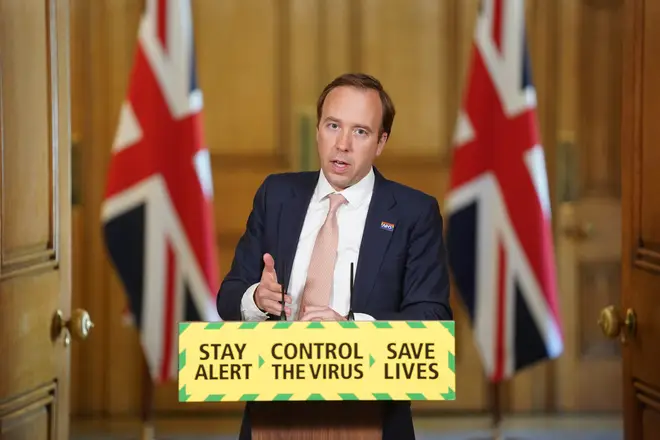
Clive Bull 1am - 4am
2 June 2020, 19:28

Health Secretary Matt Hancock has defended the Government's approach to coronavirus testing figures after the UK's statistics watchdog criticised the data as inadequate.
Mr Hancock said the way the figures were presented was "the best that we can", adding it was the "simplest way of presenting a very complex picture", at the daily Downing Street press conference on Tuesday.
But he said the Government was working with the UK Statistics Authority (UKSA) "to make sure that we are as transparent as possible" and "to make sure that the statistics are constantly improved".
Read more: Matt Hancock announces lockdown review period extended from 21 to 28 days
It comes after UKSA chairman Sir David Norgrove criticised the way the figures are presented at the daily briefings, with the headline total including both tests carried out and those which have been posted to recipients but not yet conducted.
The Government has hit targets aimed at carrying out 100,000 tests a day by the end of April and having the capacity for 200,000 tests of various kinds by the end of May.
Sir David Norgrove has today replied to @MattHancock, Secretary of State for Health and Social Care regarding the Government’s COVID-19 testing data https://t.co/jOvTnLMSXK pic.twitter.com/jSUjcZoZrV
— UK Statistics Authority (@UKStatsAuth) June 2, 2020
But Sir David said: "The testing statistics still fall well short of its expectations.
"It is not surprising that given their inadequacy data on testing are so widely criticised and often mistrusted.
"The way the data are analysed and presented currently gives them limited value for the first purpose.
"The aim seems to be to show the largest possible number of tests, even at the expense of understanding.
"It is also hard to believe the statistics work to support the testing programme itself. The statistics and analysis serve neither purpose well."
Asked if the rebuke was "embarrassing over such an important policy area?", Mr Hancock replied: "The way that we present stats is the best that we can in having built the testing programme so rapidly over such a short period of time.

21,000 contact tracers employed, Matt Hancock confirms
"We are working with the stats authorities to be able to present these statistics in a way that they're happy with and to make sure that we are as transparent as possible.
"I spoke to Sir David Norgrove today ... and we will be working with them (the UKSA) to make sure that the statistics are constantly improved.
"But the way we present them is the simplest way of presenting a very complex picture of the overall five different pillars of testing and that's the approach we've taken."
Issues raised by Sir David include:
- Lack of data on how many of the tests posted out are in fact then successfully completed.
- Lack of information at the daily press conference of the date when tests were carried out.
- Figures giving an "artificially low impression of the proportion of tests returning a positive diagnosis" because they only include diagnostic tests and not surveillance ones.
Listen & subscribe: Global Player | Apple Podcasts | Google Podcasts | Spotify
He called for test results to include information on what kind of employment people were in - for example care home or medical staff - their age, gender and location.
Shadow health secretary Jonathan Ashworth said: "This intervention from the UK statistics authority is damning.
"For test and trace to be effective we all need confidence in the data. The Health Secretary must start publishing the numbers of people tested and the number of contacts traced.
"He must stop including mailed tests as completed. He must offer a full update on how many care home residents, care staff and NHS staff have been routinely tested whether symptomatic or not."